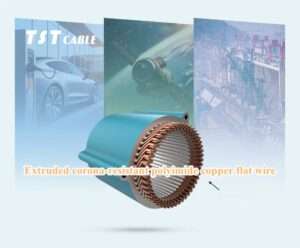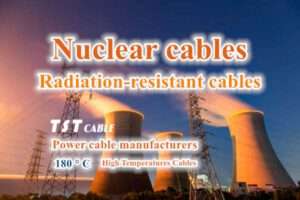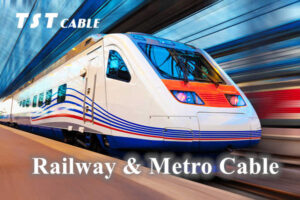
- Home
- /
- braking system
Application of Cables in Vehicle Brake Systems
1.Scene Introduction
With the acceleration of urbanization, rail transit, as an important part of urban public transportation, has been paying more and more attention to its safety and reliability. The braking system, as one of the key systems of rail transit vehicles, is responsible for ensuring smooth braking and emergency braking of trains in the driving process. As an important component connecting braking equipment and transmitting control signals, the quality and performance of braking system cables directly affect the stable operation of the braking system and the safe driving of trains.
2.Pain point analysis
At present, the following pain points exist in the process of using brake system cables for rail transit vehicles:
Unstable signal transmission: As the braking system requires high real-time and accuracy of signals, signal attenuation or interference in the transmission process of the cable may lead to delayed braking response or misoperation.
Poor weather resistance: Vehicle braking system cables are exposed to harsh outdoor environments for long periods of time, and are susceptible to natural factors such as temperature, humidity, and ultraviolet rays, which can lead to problems such as cable aging and cracking.
Installation and maintenance difficulties: braking system cable laying and installation need to take into account the train’s spatial layout and electromagnetic environment, while the maintenance and management of the cable also requires professional technical support, increasing the difficulty and cost of the work.
3. The vehicle braking system on the cable requirements
For the characteristics of the braking system, the cable needs to meet the following requirements:
High transmission performance: to ensure fast and accurate transmission of braking signals, reduce signal attenuation and interference.
Excellent weather resistance: able to operate stably for a long time under a variety of harsh environmental conditions, resisting the effects of temperature, humidity, ultraviolet radiation and other factors.
High flexibility: adapt to the complex wiring environment inside the train, easy to install and maintain.
Electromagnetic compatibility (EMC): the cable should have good electromagnetic shielding performance to resist external electromagnetic interference and ensure the stability of signal transmission.
4. The certification standards
In order to ensure that the performance and quality of vehicle braking system cables meet the industry requirements, the vehicle braking system cable products in this solution fully comply with the following international and domestic certification standards:
IEC 60349: the international standard for rail transit vehicle cables, which strictly stipulates the electrical performance, mechanical performance and environmental adaptability of cables.
EN 50264 EN45545: European standard for cables used in rail transportation, which puts forward specific requirements on the flame retardancy and oil resistance of cables.
RoHS: A directive restricting the use of certain hazardous substances to ensure that cables are environmentally friendly during production and use.
GB/T 12706 is a Chinese national standard mainly applicable to extruded insulated power cables and their accessories with rated voltage from 1kV to 35kV.
TB/T 3159 is the Chinese railway industry standard, specifically for rolling stock cables.
In addition, TST CABLES products have been certified by quality management system (such as ISO 9001), environmental management system (such as ISO 14001) and product certification.
5.Cable selection
According to the special requirements of the braking system, we recommend the following cable options:
Low-smoke halogen-free flame-retardant cable: It has good flame-retardant performance to reduce the risk of fire; low-smoke halogen-free material reduces the generation of smoke and toxic gases to improve the safety of evacuation.
Highly flexible shielded cable: adopting highly flexible materials, adapting to the complex wiring environment inside the train; multiple shielding structure effectively suppresses electromagnetic interference, ensuring the stability of signal transmission.
Selection parameters for reference (can be customized according to actual needs)
Temperature resistance: -40°C to 125°C
Rated voltage: 300V (test voltage: 3500V/5min)
Fire resistance: conform to EN45545-2 R15/R16 HL3
Insulation strength: >12Mpa
Sheath strength: >10Mpa
Cable bending radius: 6 times the outer diameter (6D)
Color: black
Tinned copper
Oxidation resistance
High conductivity
6.Product characteristics
The vehicle braking system cable products in this solution have the following characteristics:
Excellent transmission performance: the use of high-quality conductors and insulation materials, reducing signal attenuation and improving transmission efficiency.
High weather resistance: the outer sheath of the cable is made of special materials, which can resist the erosion of ultraviolet rays, humidity and other natural factors, and prolong the service life.
High flexibility: the cable has a small bending radius, easy to install and maintain.
Low-smoke halogen-free flame retardant cable: with low-smoke, halogen-free and flame retardant characteristics, it can reduce the production of smoke and toxic gases in case of fire and improve evacuation safety.
Recommended Products
Vehicle brake system cables are high-temperature, fire-resistant, and bendable, and play a vital role in transmitting signals and commands between the brake pedal and brake system components.
7. Technical Tests
In order to ensure the performance and quality of vehicle brake system cable products, we have conducted a series of strict technical tests, including:
Electrical performance test: Test the electrical parameters such as electrical conductivity and insulation resistance of the cable to ensure that it meets the design requirements.
Weathering test: The cables are subjected to high temperature, low temperature, humidity and other harsh environments for a long period of time to verify their weathering performance.
Signal transmission test: simulate the working environment of the braking system, test the signal transmission performance and stability of the cable.
8. cable laying installation and commissioning
In the process of laying and installing the braking system cables, TST CABLES will formulate a reasonable cable routing plan according to the layout of the braking system and the spatial structure of the train. Meanwhile, TST CABLES will provide professional commissioning guidance to assist customers to complete the connection and commissioning of the cable and vehicle braking system to ensure the normal operation of the system.
9. after-sales maintenance & technical support
TST CABLES provides comprehensive after-sales maintenance and technical support services, including regular inspection, troubleshooting, repair and replacement of vehicle brake system cables. Our professional team will provide technical support and solutions for customers at any time to ensure the stable operation of brake system cables and customer satisfaction.
10.Actual Cases
TST CABLES provides high-performance signal transmission cables for vehicle braking system in the subway projects of many large cities around the world. After a long period of actual operation tests, TST CABLES cables perform well. The data show that under frequent operation of the braking system, the cables maintain a stable signal transmission quality without any faults or signal distortion. In addition, the durability and compact and lightweight design of TST CABLES vehicle braking system cables are highly recognized by customers. At the same time, the service life of the cables has been significantly extended due to their high weather resistance. This success story is a testament to the safety, stability, reliability and superiority of our cable solutions in rail vehicle braking system applications.
Other solutions for cables in railway applications.
WHY CHOOSE TST
10 years of experience
Specializing in the production of railway cables for 10 years
Engineer-to-engineer one-on-one support
Engineers provide one-on-one service to assist with product selection and problem-solving
Customization according to requirements
With a strong R&D team, we support customized cables based on specific needs
Quality certification
Stringent adherence to industry standards, complete certification
Fully testing facilities
Various tests based on customer requirements
10,000 ㎡ factory
Welcome to visit our factory face to face
RELATER NEWS
Also available in:
Arabic
English
German
Indonesian
Japanese
Russian
Spanish
Thai
Vietnamese
Portuguese (Brazil)





